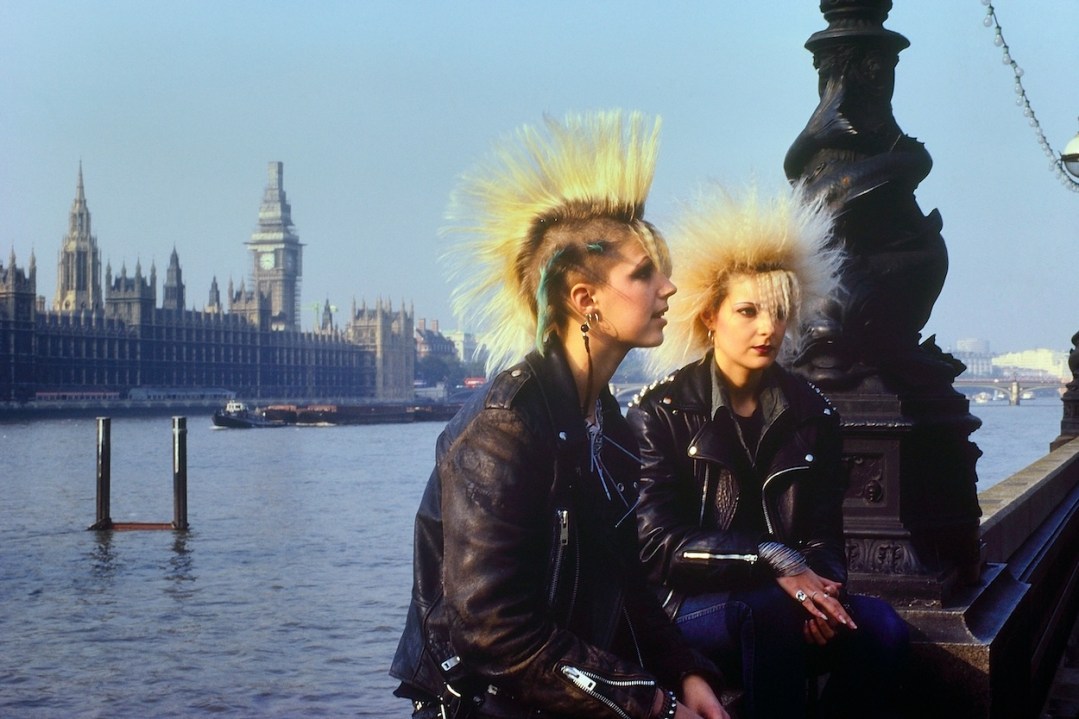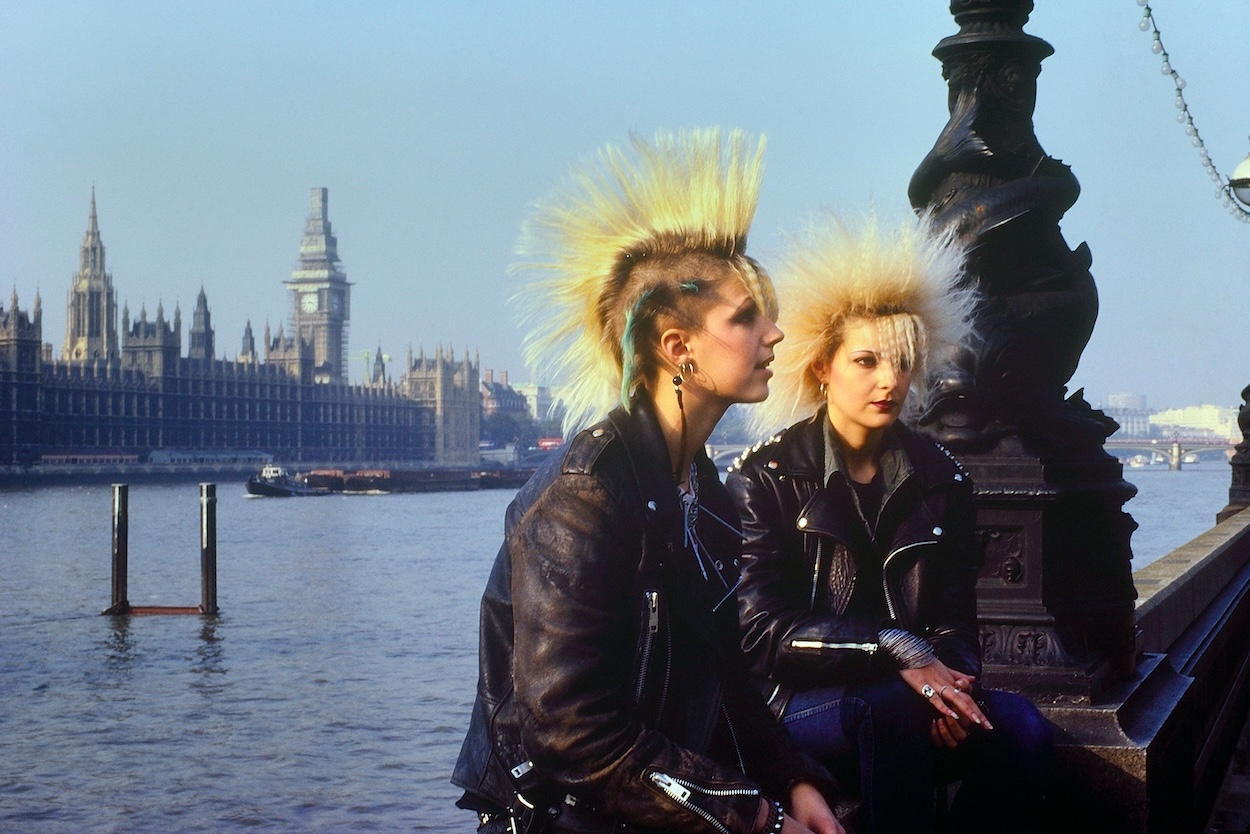‘PUNK’S NOT DEAD!’ I will sometimes write as a sign-off on emails to mates when I’ve said something particularly ‘bad’. It’s something of a joke with me; although I was around the scene early on (1976) and started my career off as a 17-year-old writing about punk, I didn’t much like it. I liked black music – disco, Motown, soul; I thought that most white music was just a nasty old racket.
The establishment has moved from right to left but remains sexist, snobbish and racist
But I do like the phrase, implying as it does a refusal to bow down to the establishment. Although we had a Labour government from 1974, it’s fair to say that the establishment of the 1970s was a fusty right-wing thing, sexist and racist and snobbish. But funnily enough, it’s still sexist and snobbish, in that women and the working-class are expected to obey (transvestite) men and the liberal elite respectively; it’s not racist in the old vulgar way but in a modish, middle-class way, dealing in the poverty of low expectations, seen best in that hilarious Labour election promise that only Jeremy Corbyn ‘can be trusted to unlock the talent of black, Asian and minority ethnic people’ when the Tory cabinet already featured more black, Asian and minority ethnic people than a Labour one ever had. Oh, and racism is also judging people on the colour of their skin as opposed to the content of their character – as Martin Luther King preferred – which is inherent in every diversity and inclusion drive, every taking of the knee, every ‘black-out’ theatre performance. When people of colour refuse to lose their agency by identifying as underdogs and waiting for whitey to save them (some to the point of becoming Conservative politicians), they may be called ‘coconuts’ and all sorts of nasty names – but in a caring, anti-racist way.
So the establishment has moved from right to left but remains sexist, snobbish and racist – and so of course John Lydon is still against it. But guess what? Whereas once the liberal elite would have cheered on punk – being anti-monarchist – now they’re appalled by it; Disgusted of Tunbridge Wells has been replaced by Horrified of Hampstead. Even funnier were the bourgeoise bed-wetters freaking out on X last week claiming that John Lydon (née Rotten) was doing something ‘un-punk’ when he pointed out that it might not be the best thing for impoverished working-class seaside communities to have vast numbers of young male illegal immigrants dumped on then with no support.
Can I say, for a start, that there’s nothing more ‘un-punk’ that writing the word ‘un-punk’ unless, like me, you’re using it in the context of an explanatory essay? I get quite a bit of this accusation too – invariably by people who have never been punks, and would have been terrified by us, but now believe that they can lecture us on what we should believe and say. Who are you going to report us to – the punk police? We were punks, not ruddy peace-and-love hippies.
Punk wasn’t ever left-wing – it was anti-establishment, so whatever the establishment is for, punk was against it. The anti-Lydon lot will always bring up The Clash as an example of a left-wing punk band, but this was more a difference of class origin than of politics proper; Joe Strummer was a lovely fellow, but he was also an upper-middle public schoolboy and thereby prone to a bit of P’n’P (poncing and posing) with his R’n’R. Of the other big punk bands, The Damned were about as political as The Munch Bunch, The Stranglers had a soft spot for the crazed Japanese militarist Yukio Mishima and The Jam were young patriots who pined for ‘the great empire’ and spat loathing at avuncular James Callaghan (‘The truth is you’ve lost, Uncle Jimmy!’). Unlike the cosy 1960s scene, they barely spoke to each other; that was the whole point of punk, to be different. But the rewriting of punk history by anxious middle-class lefties happened almost from the start; by the 1980s, punk was being recalled as a reaction against Thatcher’s Britain, despite it all kicking off three years before she became prime minister. Indeed, with her desire to destroy anything which seemed weak and outdated, there’s a case for saying that Mrs T was the most punk politician thus far. This was echoed in Sex Pistol Steve Jones’s autobiography Lonely Boy – surprisingly good – in which he understandably writes that he went into showbiz to make money as much as music, and that when he finally scraped enough royalties together to buy himself a second-hand car, Vivienne Westwood accused him of ‘selling out’. This would be the Vivienne Westwood who took an honour from the monarchy and was a shameless tax avoider. Hypocrite, heal thyself.
Punk was, as Westwood and McLaren so flagrantly demonstrated, always marbled with corruption, as indeed is every place where art meets showbiz; it gives it its piquancy. But punk is like a religion to some pathetic purists now. There was a long-running argument on a social media forum a few weeks ago about whether Anarchy In The UK was a call to real anarchic communal living. (No, that would be for the filthy hippies.) Others said (correctly) that it was simply a call to smash the status quo – and the status quo is now woke.
Punk can be traced back to historical anti-establishment art from the political cartoons of the 18th century, through Beyond The Fringe to Monty Python, all mocking the monarchy, judges, police and politicians. It couldn’t have started anywhere but England; someone said that Brexit was an amalgamation of South Downs Tories and snarling inner-city punks. It was only natural that the great charismatic loner contrarians of 20th century pop, Lydon and Morrissey, were in favour; If you’re independent and rebellious, you certainly weren’t going to be a remainer.
Predictably, the vast majority of those who identify as punks these days come across as extremely wet blankets who get their knickers in a twist over weird things; think of the hissy-fit Rage Against the Machine had over people who wouldn’t wear masks at their gigs and the American ‘punks’ who beat up ‘fascists’ who aren’t fascists in the least unless one uses the word in the manner of Rik in The Young Ones. Then we have the weirdest cause of all, trans. whereby privileged white men can whack on some rouge and call themselves women – the war for the soul of punk is being fought on this front, too.
Punk is like a religion to some pathetic purists now
At 64 I’m not quite the demographic for slogan T-shirts but if I was, I’d buy this beautiful thing I’ve seen the youngsters wearing on social media: it says ‘Terf is the new punk’, written in Jamie Reid-type font over a photograph of Mrs Pankhurst. A few female musicians have dared to stand up to trans-tyranny, though both Macy Gray and Roisin Murphy were forced into apologies – but Louise Distras, the current crooner-keeper of the flame of feminism, is made of stronger stuff. An attractive working-class Northern girl, she was once the pin-up of the punk left before drawing the ire of the all-male gatekeepers of the scene by speaking her mind; for free speech and against the promotion of feelings over fact. These beliefs shouldn’t be that shocking – especially in a milieu which prides itself on speaking truth to power – but Distras was subsequently hounded and cancelled for her views. She told me:
When I started out as a musician, I thought that punks were anti-establishment; then when my first album was released, I passed through the scene and realised it’s full of Stasi boneheads who love the boot when they’re the ones wearing it. Punks pretend to be rebellious musicians but act more like bureaucrats and propagandists who contribute nothing to music except a pathological hatred of women and the highest form of wokery I’ve ever personally encountered. Speaking your mind publicly is what making music is all about; freedom of speech and our hard-won rights as women – especially in male dominated music industry – is something that should be protected at all costs no matter what -ism we’re living under. But when the establishment and corporations support you, you are the establishment. So, for me being a Terf is about as punk as it gets.
I was there; I may not have liked the music much, but I lived the ribald and riotous experience that was punk – and I know a short-haired hippie when I see one. As I wrote in Welcome To The Woke Trials: ‘Woke is the revenge of the dullard on the wit, the curtain-twitcher on the headline-maker, the wallflower on the whirling dancer’ – add to that ‘the establishment stooge who believes himself righteous on the outlaw’. So, punk’s not dead – this time, she’s a Terf.







Comments